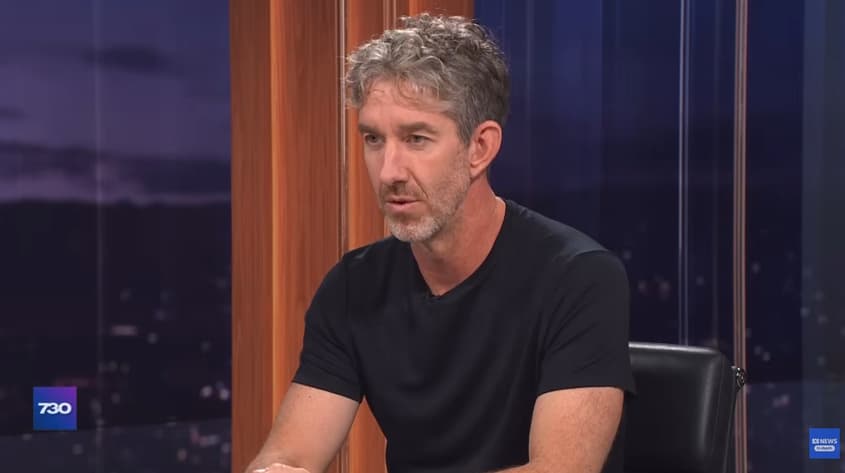Sun 2 Nov 2025 22.30

Ahead of a day strongly focused on mining, the first example Richard Denniss gave in his Revenue Summit opening address came from the arts: a classic tale of entrenched inequity.
When the property developer celebrities manufactured by TV’s The Block sell at profit or win the $100,000 prize, they pay zero tax. None. No tax at all on those very public capital gains.
When Australia’s most accomplished artists win the Archibald Prize, however—or indeed, almost every other arts prize, award or grant—that money is taxed. After working hard for decades just to be in the running, artists lose a substantial portion of their prestigious prize.
Meanwhile, all their hard work is also being stolen at industrial scale and with absolutely no consequences: big tech has mined everything they can get their hands on to feed the AI engines designed to put artists, writers and journalists out of business.
Richard Denniss’ example was timely. Last week the Attorney-General announced that no Text and Data Mining (TDM) exemption would be considered as part of copyright law reforms being demanded by big tech.
In a now-infamous interview with ABC 730’s Sarah Ferguson, Tech Council of Australia chair Scott Farquhar was unable to demonstrate a basic understanding of the rights of copyright holders, let alone the difference between fair dealing and fair use as copyright exemptions. When asked directly whether AI companies should be able to mine the entire body of work of say Midnight Oil, Bob Dylan, or Farquhar’s own favourite, Pink Floyd, with neither compensation nor consent, Farquhar repeatedly said that “the benefits outweigh” the rights of artists.
It’s a curious characteristic of Australia’s national identity. Why are we chronically incapable of valuing our own resources and our own achievements?
Last week’s Revenue Summit heard that Australia continues to allow multinational gas corporations to export our gas without paying any royalties whatsoever. And yet a 25% tax on gas exports could solve Australia’s housing crisis, argued the ACTU’s Liam O’Brien.
Whether those foreign corporations are mining Australian gas or intellectual property, “we are literally giving them our resources for free”, said Richard Denniss.
Not only does this rob Australia of valuable revenues to invest in climate crisis mitigation and public services, it also allows Japanese companies, for example, to onsell Australian gas to Vietnam and the Philippines—at profit.
One revenue opportunity where mining can learn from the arts is in resale royalties.
Just as songwriters and composers earn royalties whenever their music is played, visual artists earn royalties when their work is resold.
Take this astounding example from Canada, where there’s no such scheme in place. Enchanted Owl by Inuit artist Kenojuak Ashevak (1927-2013) was first sold for just $24, then resold years later for $158,500—without Ashevak receiving a cent from that sale. Last December, one of her works sold for $366,000.
As the value of artists’ work increases over time, or as the number of plays grows, it’s crucial that the revenues generated are reinvested back into artists’ livelihoods—not just the profits of tech platforms. If “the benefits outweigh” the rights of artists, those benefits must be seen by the artists themselves.
Of course, a resale royalty scheme for Australian gas would rely on having a royalty regime already in place—and that means better valuing what we’re currently giving away for free.
Just as we need to stop taking a purely extractive approach to our precious fossil fuels, we need to stop approaching artists’ labour as resource extraction for someone else’s profit.
Australia’s cultural and creative industries contribute $67.4 billion to Australia’s economy and are significantly larger employers than the mining industry. And yet artists pay more tax than many foreign mining companies.
The recent NSW Government summit The Art of Tax Reform brought creative industries and government revenue experts together for the first time, investigating opportunities such as tax offsets that align film industry investment incentives with the performing arts, extending incentives from other sectors to the cultural sector, and making arts prizes tax-free. The Australia Institute’s submission argued for an ambitious increase to the state’s revenue base.
For the artists whose work has already been stolen, the TDM exemption is no win against big tech. Just like all the gas Australia’s already given away, it’s too late to get it back—but unlike mining companies, the tech giants have broken the law. Theft is theft—and theirs has been brazen, pervasive and egregious. Satire writers have been quick to point out that, had the Louvre heist perpetrators been AI companies, any efforts to prosecute them would immediately be abandoned.
And if regulating and taxing big tech doesn’t sound as urgent to you as regulating and taxing gas exports, consider what’s at stake. AI’s unchecked encroachment into our lives is already robbing us of the critical thinking needed to make the big decisions that secure our future, as well as devaluing trust in journalism, democracy and truth itself.
AI regulation is one of our most urgent issues and valuable revenue opportunities. There’s much more at stake than we realise.
A holistic approach to revenue should start by valuing our greatest assets—because nothing shapes Australian culture like our natural resources and the work of our artists.
Esther Anatolitis is a writer, creative strategist and national arts leader with more than two decades’ experience shaping Australia’s cultural and public policy landscape